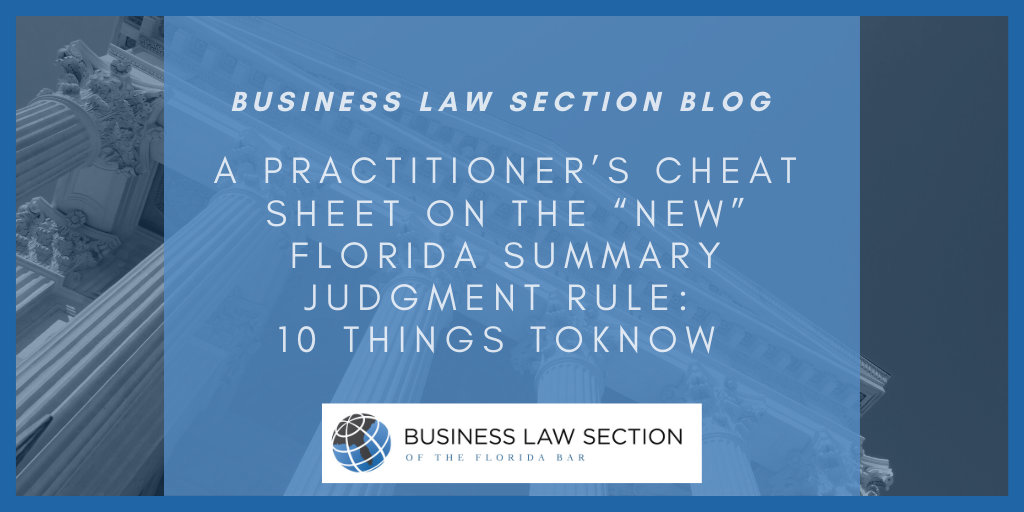by Jocelyne A. Macelloni, Barakat + Bossa
On April 29, 2021, the Florida Supreme Court adopted a new summary judgment standard. For those litigating in federal courts, the rule is nothing new; in fact, Rule 1.510 of the Florida Rules of Civil Procedure adopts most of its federal counterpart verbatim. The following overview provides 10 major changes that every busy practitioner should know about.
1. BURDEN – DIRECTED VERDICT STANDARD.
- The new standard for granting summary judgment mirrors the directed verdict standard.
- Previously, the moving party had the burden of establishing, conclusively, that there was no genuine issue of material fact as to the claim or case, in its entirety, including disproving the other party’s theory of the case. For instance, the plaintiff would not only have to establish their own case (for which they had the burden of proving at trial), but also disproving the defendant’s affirmative defenses.
- Now, the burden on summary judgment lies with the party that has the burden at trial.
- Under the new rule, “if the nonmoving party must prove X to prevail [at trial], the moving party at summary judgment can either produce evidence that X is not so or point out that the nonmoving party lacks the evidence to prove X.”1
2. TIMING.
- Previously, a party had to serve its motion for summary judgment (MSJ) 20 days before a hearing and respond 5 days before the hearing, if service was by mail, or by 5:00 p.m., 2 business days before the hearing, if service was by email.
- Now, an MSJ must be served at least 40 days before the hearing and a response is due 20 days before the hearing. No express deadline has been set for filing a reply.
- The new Rule 1.510 still provides for a hearing and ties the timing to the hearing on the motion, unlike Federal Rule 56, which does not automatically provide for a hearing on summary judgment.
3. EFFECT ON PENDING CASES.
- The new Rule 1.510 took effect on May 1, 2021 and applies to MSJs adjudicated on or after May 1, 2021.
- If your hearing is set less than 20 days from when you filed the MSJ and the nonmoving party has not yet filed a Response, you should reschedule your hearing.
- Additionally, in pending cases that have already been briefed but not yet decided, the court should allow the parties to adjust the briefings to comply with the new rule.
- A rehearing of an MSJs decided under the old rule should be decided under the old rule as well. However, a party can renew its MSJ under the new rule.
4. WEIGHING THE EVIDENCE
- Previously, courts could not weigh the presented evidence, no matter how trivial or incredible.
- Now, courts can weigh the evidence as a reasonable jury to determine the plausibility of inferences relied upon by the non-moving party.
5. MATERIAL FACTS IN DISPUTE.
- Unlike before, a “scintilla of evidence” or evidence raising the “slightest doubt” is no longer sufficient to create a disputed material fact.
- Instead, there must be evidence on which a jury could reasonably find for the nonmoving party.
- Florida cases discussing what facts are material to a claim or defense remain applicable since the materiality goes to the elements of that claim or defense.
6. EVIDENCE MUST BE ADMISSIBLE AT TRIAL.
- The rule still remains that evidence submitted in support of or in opposition to a MSJ must be admissible in evidence.
- Although the evidence attached to a summary judgement motion is no longer specifically defined in the rule, it still includes, depositions, documents, electronically stored information, affidavits or declarations, stipulations (including those made for purposes of the motion only), admissions, interrogatory answers, or other materials as would be admissible in evidence.
- You can now obtain summary judgment by proving that the adverse party cannot produce admissible evidence to support or dispute a fact.
7. COMPLETION OF DISCOVERY.
- Previously, a party could submit an affidavit as to why it could not adequately respond to summary judgment, including the need to conduct additional discovery.
- The new rule contemplates adequate time for discovery as one of the prerequisites to a summary judgment.
8. JUDGE’S FINDINGS.
- The new rule requires judges to make explicit findings for both an award and a denial of an MSJ.
9. ATTORNEY’S FEES FOR BAD FAITH AFFIDAVITS.
- Courts can now order a party who submits an affidavit in bad faith or solely for delay to pay the other party’s reasonable expenses, including attorney’s fees, incurred as a result.
- The court may also hold an offending party or attorney in contempt or impose other appropriate sanctions.
10. FEDERAL SUMMARY JUDGMENT CASE LAW.
- The new rule states that the summary judgment standard shall be “construed and applied in accordance with the federal summary judgment standard.”
- Thus, Florida practitioners can rely on the 30+ years of Celotex progeny because the “act of transplanting federal rule 56 brings with it the ‘old soil’ of case law interpreting that rule.”
Jocelyne Macelloni is a partner at the Coral Gables law firm of Barakat + Bossa and an adjunct professor of law at Nova Southeastern University Shepard Broad College of Law. Ms. Macelloni represents businesses and business owners in state and federal courts throughout the country and in various practice areas including corporate disputes, asset recovery, secured transactions, factoring and other UCC-related disputes. Ms. Macelloni can be reached at jmacelloni@b2b.legal or (305) 444-3114.
1 In re: Amendments to Fla. Rule of Civil Proc. 1.510., No. SC20-1490, 2021 Fla. LEXIS 682, at *10 (Apr. 29, 2021)(citing Bedford v. Doe, 880 F.3d 993, 996-97 (8th Cir. 2018)).

